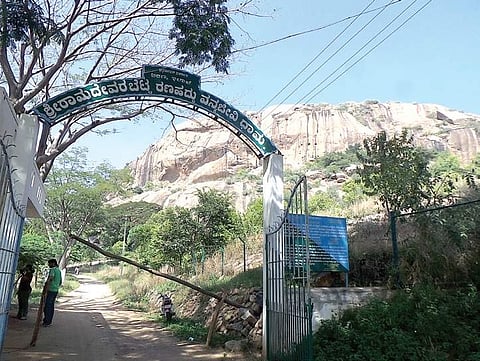

BENGALURU: India’s only vulture sanctuary, Ramadevarabetta Vulture Sanctuary in Ramanagara district, has finally got its much-needed protective barrier and notified as an eco-sensitive zone (ESZ).
Being very close to Bengaluru, the granite rocky hills have witnessed an indiscriminate expansion of industries and real estate activity in the last few years.The Central Government has notified an area from 1.30 metres to 1.80 km from the boundary of the 346-hectare area sanctuary. The total geographical area of the ESZ is 7.08 sqkm and covers a total of six villages and one hamlet.It is the only place in Karnataka where the critically endangered and endemic Indian white-backed vulture and long-billed vultures are found and breed naturally in the entire South.
According to forest officials, the ESZ was required to protect the area, the extent and the boundaries of the sanctuary and also prohibit industries, their operations and processes as specified in the zoning guidelines.
“Once the Zonal Master Plan for the ESZ is ready within two years, it will finally regulate development in this marked area. Further, a lot of harmful activities like mining, stone quarrying, setting up of pollution-causing industries, etc will be prohibited while commercial establishment of hotels, resorts, construction activities, etc will be regulated. Presently, many people have taken up major commercial and residential projects in this region but the ESZ will put a stop to this. No new construction of hotels or resorts will be allowed within 1km from the boundary of the sanctuary,” a forest official said.
With this notification, the use of Diclofenac drugs (for veterinary purposes), establishment of meat processing units and rock climbing and other allied activities will also be prohibited in the ESZ area.
According to bird experts, the population of Asian vultures is on the brink of extinction in India as they had perished after ingesting the residual Diclofenac drug found in cattle carcasses.
Despite a ban on the veterinary use of this drug, its widespread usage as an anti-inflammatory drug in cattle still continues.
Tourist traffic
The Ramdevara Temple inside the Sanctuary, which is part of an enclosure, attracts thousands of devotees and tourists during the festival season while the rocky hills attract frequent climbers and trespassers. Recent research has revealed that the high tourist traffic to the temple and youths visiting on their bikes has been a major cause of disturbance to the breeding of raptors.
Villages within ESZ
Six villages that comprise an area of 708.19 hectaresa and fall within the ESZ around Ramadevarabetta Vulture Sanctuary are: Harisandra, Madapura, Kethohalli, Basavanapura, Vaderahalli
and Hallimala.
Ecological consequences
A very important part of our ecosystem, the disappearance of vultures will have serious social and ecological consequences. They are vital to the health of human beings as they keep the environment clean of rotting carcasses and also containing the population of feral dogs.